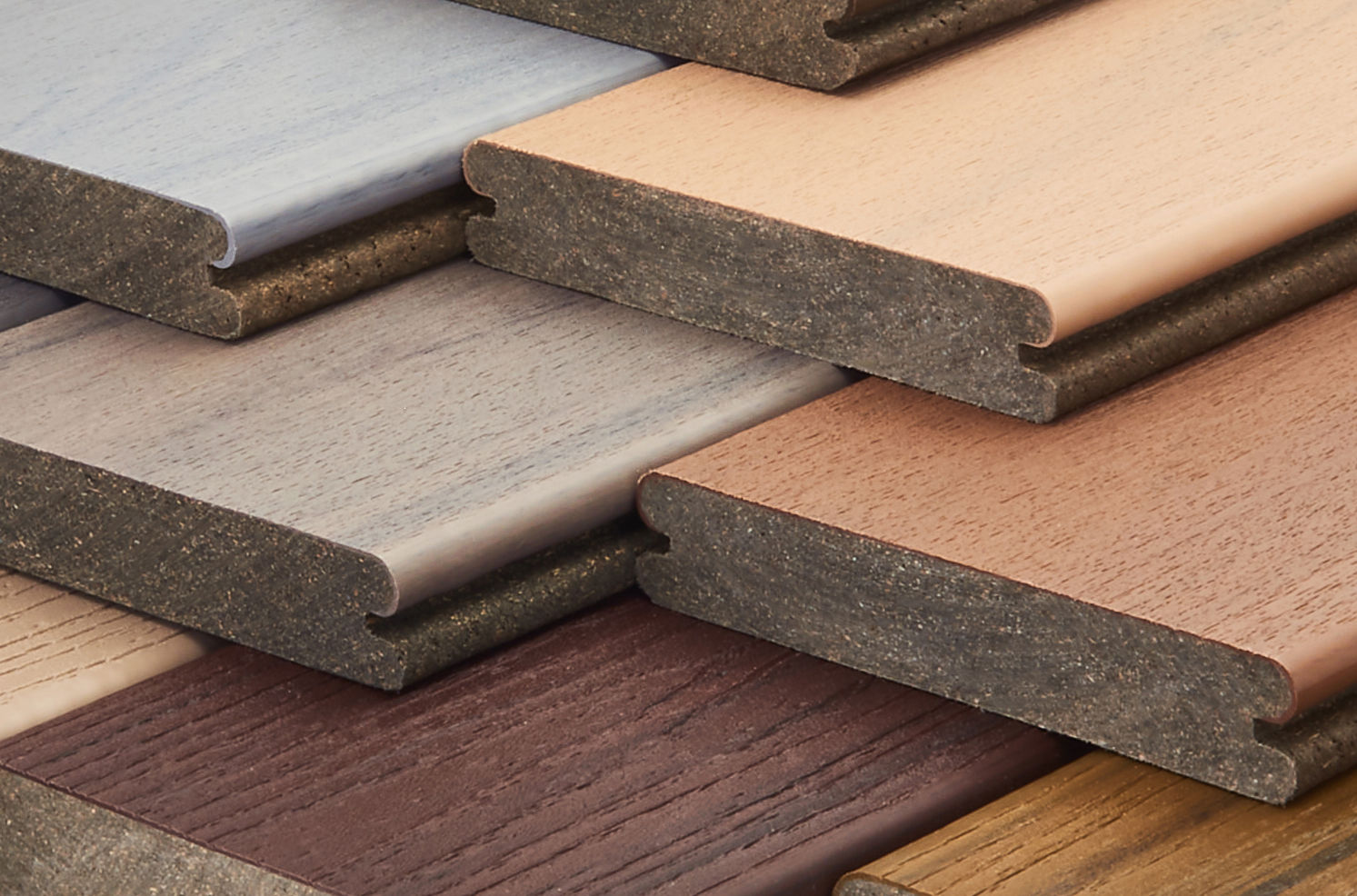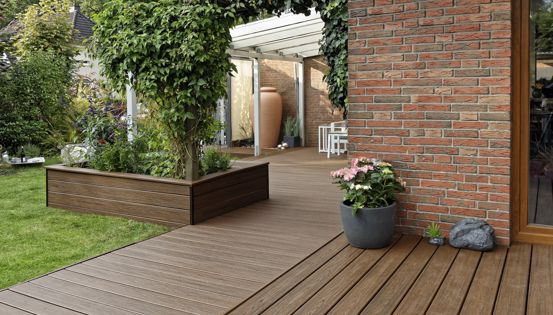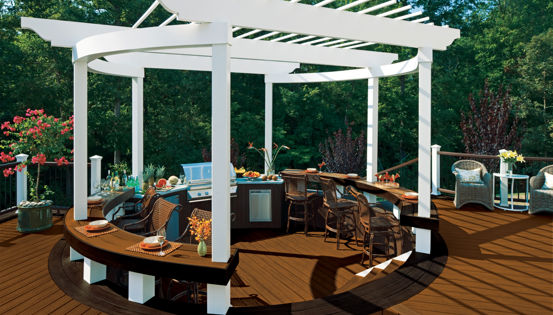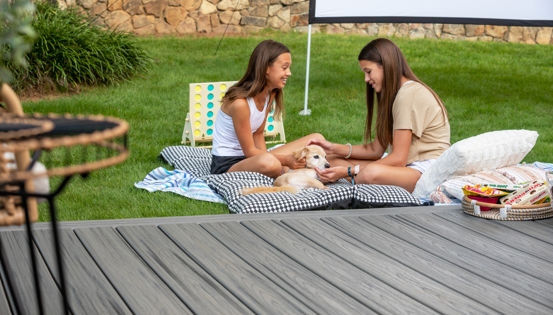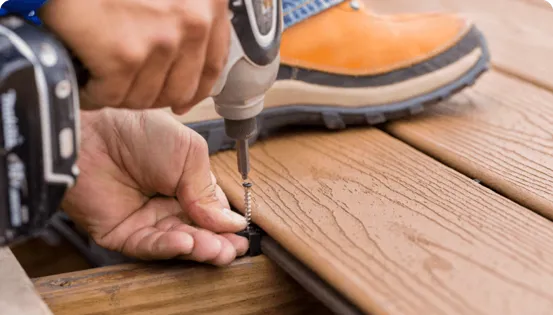The Benefits of Capped Composite Deck Boards
Capped composite decking is a modern take on the classic backyard deck, built for people who want long-lasting deck boards with the look of wood but without the upkeep. This guide explains what “capped” means, how these boards are made, and how they stack up against other options. You will also find realistic expectations for lifespan and maintenance, plus a quick way to sort “good, better, best” product tiers so you can match performance, appearance and budget.
What is Composite Decking?
“Composite” just refers to something that is made up of various parts or elements. Composite deck boards are made from used plastics and reclaimed wood fibers. By repurposing recycled materials, composite decking helps cut down on landfill waste and reduces demand for newly harvested lumber. Designed to mimic the rich appearance of natural wood, composite decking provides the same warm look and feel but also resists UV rays, rot, warping, splintering, and all but eliminates the frequent maintenance that wood decks require.
The first generation of uncapped composite decking was invented and introduced in the 1990s by Trex®. In fact, there are still some of those early Trex decks are still on homes today, proving that composites can hold up for decades. But as reliable as composite decking was, since the development of capped composites, nearly all manufacturers have phased out uncapped boards in favor of capped designs. Keep reading to learn what capped composite boards are and why they’ve become the standard in the decking industry.
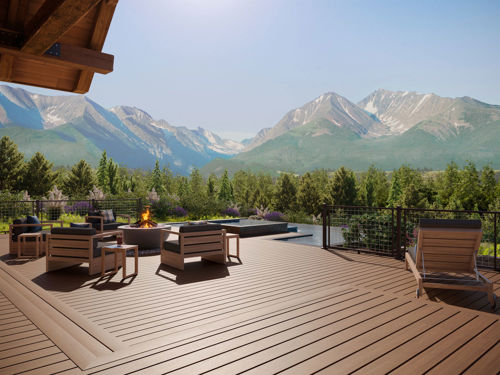
What is Capped Composite Decking?
Capped composite deck boards are standard composite boards with an added protective shell, or “cap,” that enhances durability and appearance. During manufacturing, the cap is fused to the composite core in the extrusion process, creating a board with a wood-plastic interior and a resilient plastic exterior.
The cap is typically made from a tough polymer such as high density polyethylene (HDPE), polypropylene (PP) or polyvinyl chloride (PVC)—the same types of plastics used in durable, everyday products like outdoor furniture and car bumpers. Just like traditional wood decking, capped composite boards are installed with the same tools and similar hardware, making them a straightforward upgrade for builders and DIYers alike.
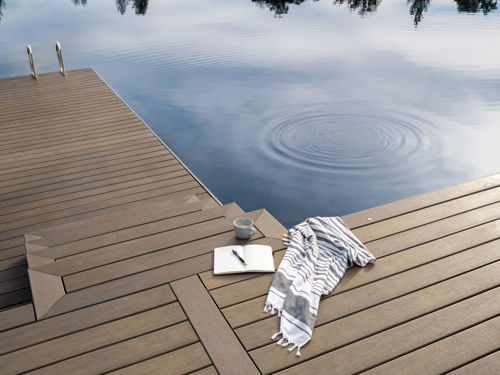
The Benefits of Capped Composite Deck Boards
Capped composite decking was developed to address the performance gaps of early composites and traditional wood. The protective shell not only preserves the look of the boards but also makes them more reliable in everyday use. For homeowners, that means less worry about upkeep and more confidence that the deck will look good and last for decades. The following is a list of how capped composite boards outperform wood and early versions of composite decking.
- Better moisture resistance – The cap protects against swelling, warping and rot, making boards less susceptible to water damage than uncapped composites or wood.
- Better UV protection: Sun exposure won’t fade capped boards as quickly, so colors stay vibrant for longer.
- Better scratch protection: The hard shell helps resist scuffs from sliding furniture, pet claws and everyday foot traffic.
- Better stain resistance: Common stains from food, beverages, or leaves are less likely to penetrate the surface.
- Easier to clean: Soap, water and a broom or hose are usually all that’s needed for maintenance.
- Lasts Longer: Many capped composites carry warranties ranging from 25 to 50 years.
Environmentally Friendly: Capped composite boards use a high percentage of recycled plastics and reclaimed wood fibers, reducing demand for virgin materials and helping divert waste from landfills.

What is the difference between Capped Composite and PVC Decking?
As mentioned earlier, the protective shell on some capped composite deck boards is made from PVC. Instead of having just a protective layer, PVC decking is made entirely from PVC and has all the same great qualities as capped composite—resistance to fading, staining, scratches, outstanding moisture resistance, and low maintenance requirements.
PVC does surpass composite in fire and smoke protection, making it a better option for homes in regions prone to wildfires or where local building codes require higher flame-spread ratings. That extra protection does come with a couple of trade-offs though. PVC boards typically rely more on virgin (non-recycled) material, making them less sustainable than capped composites, and they are also the most expensive synthetic decking option on the market. For many homeowners, capped composites strike the right balance by offering similar protective benefits, a higher percentage of recycled content and a more budget-friendly price point.
How Long Does Capped Composite Decking Last?
When properly installed and kept clean, capped composite decking can last 25 to 50 years. Longevity depends on several factors: a solid substructure, adequate drainage and airflow, regular cleaning, and climate conditions. Direct sun, persistent shade with moisture, or very hot climates may shorten the life of any decking material. Still, capped composites will outlast pressure-treated and softwoods and offer a reliable, long-term solution for most homeowners.

Good, Better, Best: Understanding the Different Quality Levels of Capped Composite Decking
Not all capped composites are created equal. Manufacturers typically offer multiple lines to meet different budgets and style preferences.
- Good (Entry-Level) – Boards like Trex Enhance® feature a scalloped underside to reduce weight and cost and carry 25-year warranties. They provide the look of wood with a straightforward, budget-friendly profile.
- Better (Mid-Range) – Products such as Trex Select®, Trex Transcend® and Trex Transcend® Lineage® often offer richer colors, deeper wood-grain patterns, heat-mitigating technology and stronger warranties up to 35 or 50 years. They balance performance with price for homeowners who want durability with more design choices.
- Best (Premium) – Top-tier lines, like Trex Signature®, push composite technology further with photorealistic woodgrains, superior scratch resistance, and 50-year warranties. Premium options are designed for homeowners who want decking that closely mimics hardwood in both look and feel, with minimal upkeep.
By understanding these quality levels, homeowners can better match their budget, performance expectations, and design preferences when choosing capped composite decking.
Learn More
Learn more about the benefits of composite decking or shop Trex Composite Decking at Lowe’s or Home Depot.
